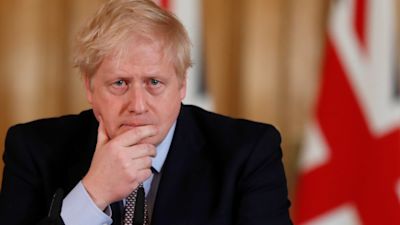Robert Peston: Will the government learn from its grotesque Covid-19 failures?

The joint health and science super-committee's report into "lessons learned" on the UK's coronavirus response may not want to "point fingers of blame" for the grotesque failures, but my goodness it leaves the reader angry and upset.
It confirms so much that we knew anyway, namely:
1) The early consensus among ministers, officials and scientists was that "herd immunity by infection was the inevitable outcome".
2) That this led to lockdown being delayed, at a cost of thousands of lives.
3) That there was a "serious early error in adopting this fatalistic approach and not considering a more emphatic and rigorous approach to stopping the spread of the virus as adopted by many East and South East Asian countries". 4) That there was "groupthink" among official scientific advisers and the government which meant "we were not as open to approaches being taken elsewhere as we should have been".
To be clear, the success of countries like Taiwan, South Korea, Singapore and China in limiting the spread of the virus through strict isolation of those infected and prohibitions on travel was conspicuous as early as February 2020.
The approach was rejected by ministers, scientists and officials as simply not the British way.
For the avoidance of doubt - and before I move on - this "Whitehall and Britain knows best" culture remains a cancer in the system, contingency planning against future risks is lamentably poor, and is a reason why the current response to the energy spikes and supply chain breakdown has been so chaotic. Rightly the MPs on the committee, chaired by former Tory ministers Jeremy Hunt and Greg Clark, highlight the "serious mistake" of stopping testing for the virus in the community just as cases were really taking off, in March 2020.
And it is almost a bad joke that the UK was one of the first countries in the world to develop a reliable test for Covid-19 but then "failed to translate that scientific leadership into operational success in establishing an effective test and trace system during the first year of the pandemic".
The committee says "vast quantities of taxpayers' money" was directed at NHS Test and Trace, but its performance was "slow, uncertain and often chaotic".
It took far too long - "the best part of a year" - for the government to acknowledge that "the optimal structure for test and trace is one that is locally driven with the ability to draw on central surge capacity".
The section on "the many thousands of deaths which could have been avoided" in care homes will probably make your blood boil.
The MPs identify a "lack of priority attached to social care in the initial phase of the pandemic" - that is negligence in the care of the most vulnerable people in our communities - which was "illustrative of a longstanding failure to afford social care the same attention as the NHS".
They cite "the rapid discharge of people from hospitals into care homes without adequate testing or rigorous isolation" as a mistake which other countries - notably Germany and Hong Kong - did not make.
This combination of this negligence and failure to learn from abroad is a consistent and depressing theme. All that said, the development, procurement and roll out of vaccines is an important success, as is the RECOVERY trial that identified Dexamethasone as an effective treatment and Hydrochloroquine as an ineffective one.
But we are doomed to mediocrity as a nation if we refuse to learn from what we got wrong.
That wouldn't be far enough away from the monkeys and typewriters approach to writing Shakespeare, the infinite monkey theorem route to greatness. And there's another thing. Our national psychology therapy on the Covid-19 debacle will only be half complete if we simply point to flaws in the system.
Boris Johnson's promised public enquiry must be about individuals taking responsibility for what went wrong.
This is not about vindictive blame. It is about cultural renewal, that can only take place when we properly understand who did what, why and when.
The part of the report that is most upsetting relates to the grotesque racial and social inequalities that the pandemic exacerbated.
MPs highlighted the "increased exposure to Covid as a result of people's housing and working conditions".
And what made me wince with vicarious shame was this: "We also hear that black, Asian and minority ethnic staff in the NHS, who are underrepresented in leadership and management roles, faced greater difficulty in accessing the appropriate and usable Personal Protective Equipment".
There is an urgent need, say MPs, "to address the working conditions which have put staff from black, Asian and minority ethnic communities at greater risk". Quite. They also shine a light on the "disproportionately high mortality rates that people with disabilities and autistic people have suffered - because of inadequate access to care, and "because access restrictions which prevented family members and other carers accompanying people with learning disabilities in hospital to perform their expected advocacy role".
The appalling consequence - and I choose my words forensically - was that "'do not attempt CPR' notices were issued inappropriately for some people with learning disabilities".
To put it another way, vulnerable people died for the want of someone who loved them at their bedside to champion and protect them.
Never again. Please.